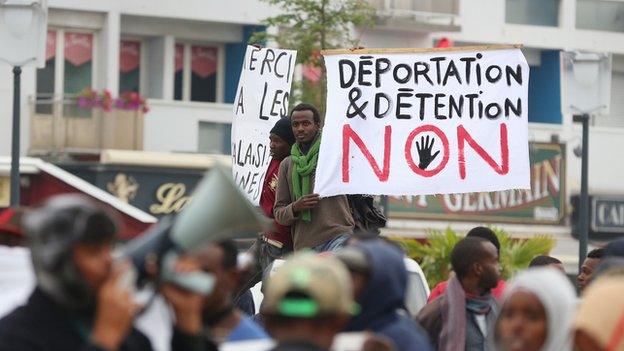Migrants making '100 illegal attempts a day' to enter UK
- Published
"The growing British economy means thousands more will do whatever they can to reach our shores", reports political correspondent Carole Walker
Migrants made about 100 attempts a day to get into the UK illegally this summer, official figures suggest., external
Between April and July 2014, 11,920 so-called "clandestines" were caught trying to enter the UK illegally by the British and French authorities.
This compared with 11,731 for the whole of 2012/13 and 9,632 in 2011/12.
The Home Office said it was contributing funds towards French efforts to boost security at Calais and other ports in northern France.
The UK's chief inspector of borders, John Vine, said more resources were needed to tackle the problem at French ports.
Campaigners for reduced levels of immigration said the figures showed the scale of the problem the UK was facing.
The figures, showing a sharp rise in the number of people trying to get into the UK illegally since 2010, were published following a freedom of information request by campaign group Migration Watch.
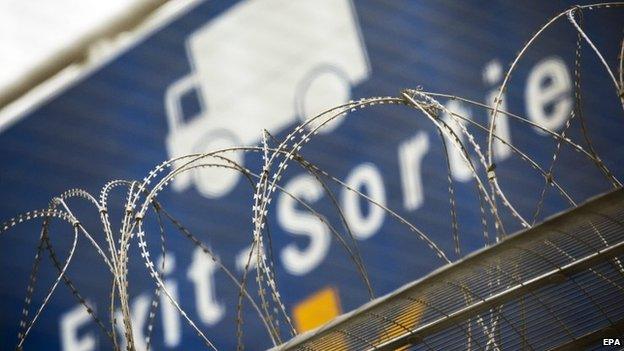
The UK recently offered £12m to build extra fences and other security measures at Calais
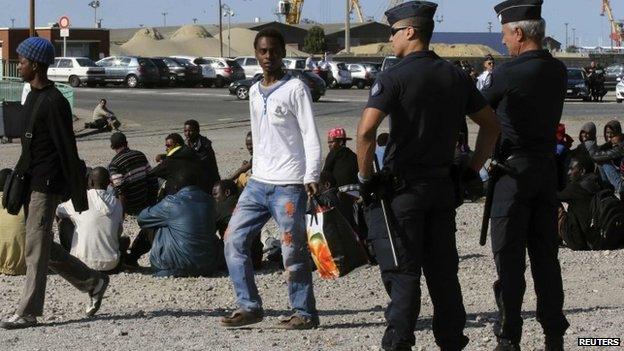
The French authorities have warned that the situation is likely to get worse
In 2013/14, 19,003 people were detected and prevented from entering the UK illegally by the British and French authorities, a 60% increase on the year before.
The figure was more than 7,000 higher than in any year since 2010/11, when the equivalent total was 10,916.
The 11,920 figure for April-July 2014 implies about 100 attempts were being made every day, on average, during that period.
However, that does not mean 100 migrants were seeking to enter the UK every day, as individuals could have been making multiple attempts and the numbers could vary considerably from day to day.
'Magnet'
The French authorities say about 2,500 migrants are camped out in Calais trying to reach the UK.
The mayor of Calais has said the problem is a European one rather than a French one and has suggested that the British benefits system is acting as a "magnet" for migrants.
Keith Vaz, home affairs select committee: "The real problem is to deal with this when migrants enter the EU - by the time they get to Calais it's actually too late"
Migration Watch, which campaigns for much tighter restrictions on legal immigration to the UK, said the figures highlighted the fact that the UK was a "very attractive destination" for illegal migrants.
"The sharp rise in the number of clandestines might reflect more effective detention but an increase on this scale is more likely to be due to increased pressure on our borders," its chairman Lord Green told the Daily Telegraph.
"Part of that may be due to deteriorating conditions in the Middle East and Africa but there is little doubt that the freedom of our society, the existence of a black market in labour and the presence of relatives and friends add up to making the UK a very attractive destination.
"The government is seeking to make it more difficult to live in Britain illegally but it will take some time for recent measures to take effect."
'Growing crisis'
Mr Vine said the UK and French authorities were working "very well together" to combat the problem but more needed to be done.
"Clearly the authorities are under tremendous pressure at the border in relation to this issue," he told BBC Radio 4's Today programme. "There's obviously great pressure on that part of the border. The only thing I can suggest that perhaps is required is more resources.
"We found that people found in lorries were being released to the French authorities but no record was being kept of who they were. And of course when they try again and very often succeed in getting into the UK as irregular migrants, the authorities in Britain have no record of who they are."
Home Office minister James Brokenshire said the UK had made "significant investment" in strengthening security and infrastructure at Calais and other French ports.
"Using some of the best technology in the world, our officers prevented more than 18,000 attempts to cross the Channel illegally in the year to April 2014, a rise of more than 60% on the previous year.
"We have also committed £12m to further bolstering security at Calais and driven down the cost of back-office functions, allowing us to invest in front-line operations."
David Hanson, shadow immigration minister, said: "The government has ignored repeated warnings from Labour and hauliers about the growing crisis at Calais. David Cameron needs to realise how serious this problem is and take urgent steps to work with our allies in Europe to sort it out.
"Labour has put forward funded plans for 1,000 more border staff to help sort the problems out."
- Published28 October 2014
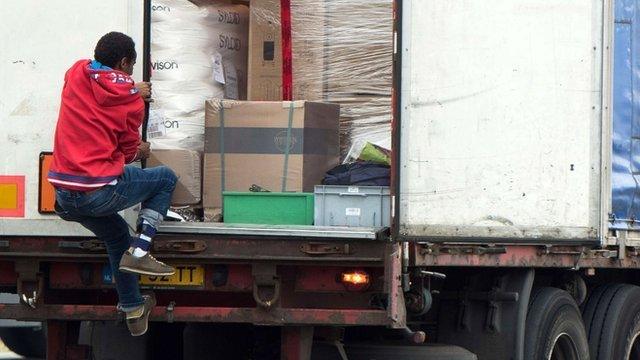
- Published23 October 2014
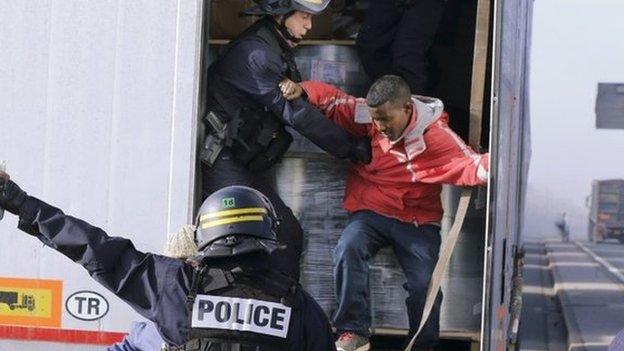
- Published6 September 2014
